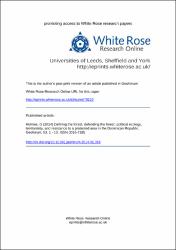/admin/item?itemID=f8a9a130-9d71-4921-9f50-c6017498a426
Defining the forest, defending the forest : political ecology, territoriality, and resistance to a protected area in the Dominican Republic

View/
Type of Access
OpenMaterial Type
ArticleType of Content
Scientific researchLanguage
EnglishCollection
- Investigación ambiental [1750]
Metadata
Show full item record| Abstract: | Political ecologists have considered the social and economic impacts that nature reserves, national parks and other forms of protected area can have on neighbouring communities, and how this can generate conflicts between them. This paper analyses such conflicts through the lens of territoriality, considering how the way protected area territories are created, delineated, and defined is linked to the social impacts experienced by local people. Conflicts between locals and conservation authorities over protected areas are about rival attempts to define the boundaries of protected areas, who the land should belong to, what it should be used for, and what its purpose is. Yet the ability of local people or conservation authorities to impose their meaning is unequal. It illustrates these processes with the example of a scientific reserve in the Dominican Republic, and a decades-long conflict to define what the reserve should mean, what it should look like, and who it should belong to. |
| Author(s): | Holmes, George
|
| Date: | 2014 |
| Published: | Geoforum, 53, 1-10 |
| Citation: | Holmes, G. (2014). Defining the forest, defending the forest: political ecology, territoriality, and resistance to a protected area in the Dominican Republic. Geoforum, 53, 1-10. Recuperado de: |
| URI: | https://bvearmb.do/handle/123456789/1926
|
